I’m no pundit; I’m a person and this post is personal. Many of the themes I touch on are contested and my personal perspective may not sit well with some. That is fine, but before an attempt is made to attack what follows, ask a single question, is this personal for you? I didn’t intend to write this for many reasons, but mainly because I can do without quite possibly having to defend my personal perspective, which isn’t something one should have do. Nevertheless, it’s been written and posted now, so any and all rights except anonymity have been waived.
I decided to write this post on what has happened, is happening and may happen in Hong Kong in response to a tweet from Bloomberg columnist Andy Mukherjee with a link to a piece authored by a former Financial Times Hong Kong bureau chief Rahul Jacob on the events unfolding in Hong Kong. Mr. Mukherjee has a significant number of readers from India and the rest of South Asia. His tweet read that the piece was “the only thing you need to read today” asserting to his followers it was definitive. I did read it in full and that was enough to provoke a response.
I’ve been reading Mr. Mukherjee since the turn of the millennium and am aware of his background as a first-generation expat or migrant and his career as a financial journalist both in print and on television. Mr. Jacob’s background I am less familiar with but having read his definitive piece it became clear to me the assertion was misleading if not downright suspect.
The realisation occurred when the author repeated what has been said many times by many protestors, journalists and academics. That there should be sympathy for Hong Kong Chinese, who are unique and distinct from their mainland brothers and sisters, are the children and grandchildren of refugees, who fled from oppression, not poverty.
This claim of unique identity and more importantly injury to that identity is incendiary for reasons I will elaborate on later. However, once it was made and without context, it was obvious the piece was not definitive and the author could not be credible. Having read it, I saw Mr. Jacob was unwilling or unable to tell the whole story. Instead it was yet another retelling of parts of the story that are convenient to the narrative. One constructed by a fawning international media, whose fickle attention appears bent on manufacturing the consent of domestic audiences for what appears to be inevitable future policy.
I want to be clear; I am not a Beijing apologist and my sympathies do not lie with the Party. What little wealth I have was built on the back of the rule of law, personal freedoms and political stability. All three are what made Hong Kong an attractive destination for international companies to establish their base over rivals and for mainland companies to raise capital. I may have benefitted from unprecedented growth in China, the product of an authoritarian political system, but that has been underpinned by the three key principles without which life would have been possible but not as pleasant. All three were critical to Hong Kong’s rise as an international finance centre but only two were necessary and remain so for its continued prosperity.
The key sentence in this post is the last one, that, in essence is the basis of my view, and if you have read my soliloquy this far and are bored already, that really is all you need to know. Some may be surprised perhaps angry at the suggestion universal rights are not necessary for continued prosperity and I will attend to those concerns in due course with examples. The short version of my argument is that Hong Kong’s future is at risk if political stability never returns and the rule of law is undermined. Governments in Beijing and Hong Kong as well as the protestors themselves are compromising both and at this stage playing the blame game is no longer relevant.
Bubble bubble toil and trouble
There are a number of fault lines that have been exposed by this recent set of protests that have been boiling beneath the surface since British sovereignty over the territory. Several issues run parallel, but the most important are sovereignty, inequality and policy. The first point that must be recognised is Hong Kong’s economy is almost entirely dependent on the mainland and the most thoughtful supporters of the protest movement that I have encountered understand this problem implicitly, because with dependence comes subservience.
The foreign passport holding thoughtful say for Hong Kong to be truly free it must diversify away economically from the mainland and are fully aware of the cost of such a strategy. To achieve that, the people of the city, those that cannot leave, must be prepared to pay the price, which is almost certain to be a hefty reduction in living standards. Assuming the entire population is willing to accept the cost, the question then becomes what should Hong Kong’s economic model be if it is no longer to act as the gateway to China? Whom should it serve as a legal, financial centre and port? No model springs to mind immediately, perhaps one will evolve organically. But there are other cities in the Asia Pacific that would be more than willing to assume the role that Hong Kong chooses to abdicate.
All we need is just a little patience
The second part of the strategy articulated by the thoughtful is one of patience. They say in order to achieve autonomy or outright independence, patience perhaps even inter-generational patience is necessary. They argue China faces multiple economic problems, collapse of the regime is inevitable and when that occurs, the aspirations of Hong Kong’s people will be realised. Given what has happened historically with these types of regimes, the profound and myriad challenges China faces, that is not an unreasonable expectation and it is not something I would bet against, nor am I willing to wager on it either. I just don’t know and I’m skeptical of anyone who says they do.
Inevitable collapse isn’t confined to the protest movement, this is an argument many make globally. There are several questions surrounding this claim. Firstly, survival is a powerful incentive. If there is collapse, it is either because the leadership is unwilling to make the necessary reforms or just not competent enough. Both are large assumptions. Secondly, what sort of democratic transition will occur and will it be orderly or chaotic in a country the size of China? What are the global implications of a chaotic transition? Most importantly what will be the character of the new regime, liberal or authoritarian and is there any reason to believe it will be any less nationalist and revisionist than the one it replaces?
Less is more
The protest movement has articulated five demands, and all but the last are possible in my personal opinion. In fact, the first demand was eventually met. The fifth demand is for universal suffrage and a directly elected chief executive and legislature. Many who support the movement ideologically but not critically including lawyers and scholars say this is enshrined within the Basic Law, Hong Kong’s mini constitution. There is truth to this claim, universal suffrage is indeed enshrined, however it is conditional and the language used to define the condition ambiguous enough to be litigated.
The Basic Law was negotiated and drafted in the years between 1984 when the Joint Declaration was agreed and following June 4th 1989. It is hard to believe anyone party to those negotiations misunderstood the intentions of inserting ambiguity into the condition. It is almost inconceivable that a candidate for chief executive is put forward that does not have the blessing of Beijing. If one accepts that logic then really the only difference would be the current system of candidates first vetted by Beijing and elected by a limited franchise would be extended universally which does not solve the fundamental problem of legitimacy.
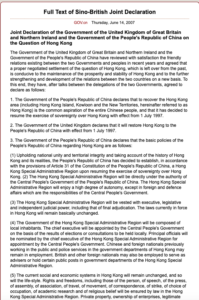
One would need to pin their hopes on Beijing understanding the current crisis is one of legitimacy, is responsive to that and willing to eventually make concessions to restore political stability. This is rational because without concessions, unrest will likely continue in perpetuity and quite possibly spread. Equally rational is the view that an authoritarian regime on the mainland, without legitimacy earned at the ballot, is seen to be caving to the demands of a small subset of people, granting them privileges the rest of the country does not enjoy and the implications that would have on the regime’s survival.
The third part of the strategy is one of non-violent protests. I imagine everyone visiting this blog will be familiar with this. It is tactical and there is data to back this strategy up, though I expect that too would be contested. Nevertheless, according to that data set, the number of non-violent protests that were successful at achieving their goal between 1990 and 2014 was double the number of violent protest movements and the reason is simple. Non-violent protests allow everyone to participate, violence makes large sections of society reluctant and this is consistent with what people tell me in Hong Kong. The people I know and love are not active because they fear violence and not out of apathy.
The fourth part of the strategy was more aggressive, advocated by some of the thoughtful and rejected by others, known as Marginal Violence Theory. The goal was to incite (note the use of the term incite not provoke) a violent overreaction from the police and government using non-violent means, in order to generate support locally and internationally. The difficulty with this strategy is that those attempting to deploy it are amongst the most emotionally invested and for them the line between violence and non-violence is blurry. Once the line is crossed as it was several times, support can be lost quickly. Nevertheless, despite violence, those fears never materialised and support remains entrenched but is starting to ebb in my opinion.
Marginal violence has now been abandoned and the strategy has evolved into outright violent confrontation, sometimes indiscriminate. Molotov cocktails are hurled, police are attacked with baseball bats and truncheons and unsympathetic civilians have been beaten brutally by mobs. During what was meant to be a peaceful three-day paralysis of one of the world’s busiest international airports, the protests descended into outright mob violence beating a Beijing proxy within an inch of his life in front of the global media. That is not to say the Hong Kong Police Force is free from blame. The government and police response to the protesters has been inept, and the violence has been brutal and excessive. I will return to the police later in the post.
The outbreak of violence has resulted in a schism within the movement. Moderates that oppose the violence for reasons articulated earlier and radicals who believe violence is the only path available. It would appear moderate voices are being drowned out. The movement as a whole seems unwilling to accept internal self-criticism and publicly distance itself from individuals whose behaviour is counterproductive. Frontline protestors violently confronting police are being lionised with some fairly disturbing rumours circulating about the rewards on offer that cannot be verified so they are not worth repeating. Nevertheless, the ban on criticising bad behaviour means self-correction is all but impossible.
If we burn you burn with us
The argument advanced for violence is, in 2014, the non-violent “Occupy Central” protest which lasted 79 days was cleared by police. The government was unresponsive to demands, life as usual resumed, nothing changed and therefore non-violence failed. This view became visible to me for the first time when protestors violently forced their way into the Legislative Council chamber where proposed laws in Hong Kong are debated and passed. Once they made their way into the council chamber protestors held up signs displaying messages explaining that they had tried to do things the “right way” but this was now the only way.
The strategy now being articulated is the slogan from the movie Hunger Games “If we burn, you burn with us”. Mutually assured destruction in an asymmetric world in other words. Some of the thoughtful even accept the claim of failure and corresponding call for violence.
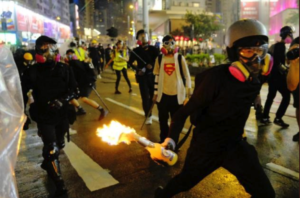
Declaring failure, because political goals were not achieved after 79 days is premature to say the least. Achieving a positive outcome can take years perhaps even decades. Is it legitimate to claim failure after less than three months and eschew one strategy in favour of another on that basis alone? Occasionally I will succumb to subjectivity throughout this post despite every intention to avoid doing so and here I do so for the first time but not last, and would argue no.
One idiosyncrasy of the now violent protest movement in Hong Kong is on the surface the city appears to function almost normally during working hours and on week days. Business continues as usual, financial markets are open and if one were to walk along Queen’s Road Central during lunch hour, they could be forgiven for being completely unaware that Hong Kong is facing its worst political crisis since the Cultural Revolution. Some journalists covering Hong Kong express surprise that protests are generally confined to weekends and after working hours. This is no surprise for me and when horse racing season begins in the next few weeks, I’d be shocked if a spontaneous protest disturbed attendance.
They may say I’m a dreamer
Non-violent movements are rarely, if ever, actually peaceful. There are always frustrated individuals and groups who disagree with the strategy and resort to violence. What I believe to be the key weakness of the movement, is a lack of leadership. Strategy is crowd sourced online on the LIHKG forum and Telegram, mainly by millennials and university aged children. People with the least to lose if Hong Kong burns and the CCP doesn’t burn with it. It is not the most thoughtful whose voices are listened to, it is the loudest and most shrill that are heard.
One reason for the leadership vacuum is there does not appear anyone capable of assuming the role. Those that led the 2014 Occupy Central movement were arrested and the time spent in prison appears to have resulted in radicalisation rather than reflection. Joshua Wong was released as the protest movement began to escalate. Instead of emerging as a leader capable of commanding the respect of protestors, his rhetoric has been rabid and his actions questionable. Mr. Wong is optically useful, someone whom politicians and diplomats can meet with to show support for the protest movement, but has little value beyond mere symbolism.
Global mainstream media seems to adore this new type of leaderless movement believing it to be part of “Be Water” tactics for overthrowing a regime, which is shapeless, formless and difficult to defeat. Having no leaders, they say, makes it impossible for the authorities to target specific individuals. What is happening in the absence of leadership however is mob mentality and uncontrolled violence. The closure and near lynching at the airport was very unwise and the movement was very lucky the images syndicated globally the next day by their editor fans in Western newsrooms were mainly those of their apology rather than their brutality.
Fight the power, don’t fight the means
The leaderless movement has focused its attention on the subway, incensed that its management have cooperated with the government. The MTR is considered one of the finest mass transit systems in the world and Hong Kong depends on it. In order to really “Be Water” large numbers of protestors need to be able to gather and disperse quickly. The only way to do that in a city such as Hong Kong is by MTR. This is a serious pain point, for the protestors, the government recognises this and has started shutting stations where protests are expected to take place. Riot police are seen patrolling the stations, boarding trains and searching travellers.
Though the quasi-sovereign MTR Corporation is publicly traded, it is still majority owned by the government and its management are completely beholden. No one working for the company signed up for a job that would one day force them to make a choice between providing for their families or supporting a protest movement. Some protestors either do not understand that or do not care. MTRC and its employees are being demonised, protestors are vandalising stations and setting entrances on fire. The protest movement depends on the MTR for effectiveness, in fact Hong Kong itself relies on the Mass Transit Railway Corporation in order to function. Neither the protest movement nor the city can survive without it.
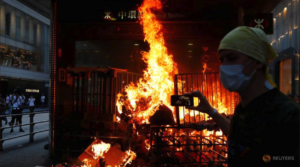
A leaderless protest movement that seeks political change seems almost destined for failure, for many reasons. Chief among them political movements need a leader or leadership to articulate aspirations, develop strategy and with the moral authority to impose restraint on counterproductive behaviour. An astute political protest leader may even be able to prevent radicals from coopting the whole movement, shielding moderates from criticism by re-iterating values, ensuring everyone can remain engaged. Mob violence could be constrained, and more importantly diversions such as the MTR would be avoided. A leadership would understand the need to fight the power and not fight the means.
Tactically speaking it is not politically adroit for a movement with no leader to embark on a long-term strategy that embraces the most radical, one that condones violence and vandalism. The reason for this is twofold, firstly violent tactics need to be rational, strategic and not emotional, a test that this leaderless movement consistently fails. Secondly violence forces everyone to make a choice, they otherwise would never make. Eventually everyone in Hong Kong will have to choose between radical tactics or peace depending on how long unrest continues.
The choice I refer to, is one I understood intuitively would occur during the days of Marginal Violence, but a more sophisticated argument has been constructed by the cantankerous Tanner Greer. Mr. Greer claims whilst the population as a whole has a wide spectrum of opinions, radicals no longer believe arguments are effective and must resort to violence instead. The goal of the radical is to coopt everyone. To achieve this, radicals, manipulate events so the debate is no longer about issues and is instead one of identity. You are either with us or against us.
Mr. Greer’s fundamental claim, it is possible to compromise on issues but impossible to compromise on identity. Mr. Greer was of the opinion the choice has been made already following what he considers to be the failure of a General Strike. According to Mr. Greer the wider population had rejected radicalism and his sense was there is growing desperation within the movement, fearful it will collapse and the inevitable repercussions that will surely follow. He may have called that result a little too early in the day given what is still happening in Hong Kong, but I would tend towards thinking this is how it will play out in the end for reasons I will discuss eventually.
Radicals or revolutionaries actively seeking to create crisis making compromise impossible forcing people to choose a side is a timeless strategy, made famous in China by Tiananmen Square pro-democracy leader Chai Ling during June 4th 1989. Those willing to burn, bleed and die in literature, are sometimes referred to as “useful idiots”. This is not the first time the PRC has had to contend with such a strategy and it is hard to imagine whomever is responsible for Beijing’s policy response is not fully cognisant of the play.
The now infamous speech Ms Ling now claims was taken out of context
Faith no more
Who are the protestors and why are they protesting? The answer to the first part is a wide cross section of society representing a majority ranging from students to lawyers, retail bankers to civil servants across all age groups. All most everyone but the business elites. What Mr. Jacob failed to mention in his piece is there is a not insignificant minority that do see themselves as Chinese, do not share the claims of unique identity and injury, are angry at being forced to absorb the cost of those claims and whose voices are either ignored, ridiculed or vilified.
Those who do not support the protests are branded mainlanders, communists or triads. Some quite obviously are one or more of those, but it is not plausible that this is true about everyone that is unsympathetic. The media in its zeal to portray a binary narrative of good vs evil has almost completely ignored this minority with some exceptions. Their rallies are covered but their thoughts and feelings have on the whole but not the margin, been reduced to mere soundbites. Mainstream international media with a few exceptions is not really interested in their why.
Does that look like a united city?
If you were to read Mr. Jacob’s piece or followed the events casually you would be led to believe the view in Hong Kong is universal when in fact there is a cacophony of voices articulating a multiplicity of views across the entire spectrum. From radical protestor to complete antipathy and in fact Hong Kong is now deeply polarized. There is a generational divide, those that built the city into what it is who consider themselves Chinese and those who see a future with nothing to build on who don’t. If you drilled further into the generational divide you would find even that binary is misleading.
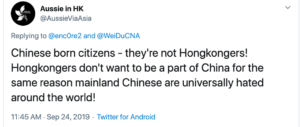
Tomorrow if by some miracle genuine universal suffrage were granted there would be peace in name only, otherwise it will be the continuation of war by other means. For every person that has taken to the streets, there is at least one other person that has not. The protestor response to that claim is 2 million took to the streets, translating to roughly two-thirds of the population once mainland immigrants and minors are stripped out. The former constitutes at least one million residents whose opinion is presumably irrelevant and I have not yet come across a credible source for the exact number of marchers showing methodology for the estimate.
And justice for all
Why they are protesting is multidimensional. Ostensibly the latest set of protests began in response to an extradition bill proposed by the current Chief Executive that was largely seen as an attempt by Beijing to exert its sovereignty on Hong Kong through the backdoor. The fear was that Beijing could target individuals politically, have them arrested in Hong Kong and then sent to the mainland. This is a perfectly natural and legitimate fear but it is not completely grounded in reality. The government failed to communicate the bill properly, did not engage with the public fully before putting it forward for debate in the legislature. When it became clear there would be an enormous backlash, refused to suspend the debate and continued to push to get it passed.
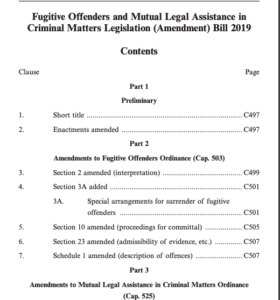
The media is guilty of some fairly dubious interpretation of the bill catering to the primary fear that individuals could be arbitrarily targeted for their political or religious beliefs. To begin with, the bill itself only allows for extradition of individuals that have committed criminal offences under Hong Kong law punishable by a minimum of 7 years (initially 3 but after feedback increased to 7). It would not allow for the extradition of an individual speaking freely, for political activism, or human rights work related to the mainland as has been claimed, though a trumped-up charge might and even that is debatable as we shall see.
Secondly, the bill does not allow for the Chief Executive to determine whether an individual can be extradited, that decision is left to the courts. The Chief Executive can only approve or reject a court ordered extradition decision, rubber stamping the decision, unable to force an extradition themselves. The bill also allows for Hong Kong residents who committed crimes in the city and fled to mainland to be extradited back to the city to face trial and currently not possible. It also means Hong Kong residents cannot travel to China and commit serious crimes and return home with no consequences.
The extradition bill does not allow for individuals who committed crimes in Hong Kong to be extradited to the mainland for trial. Extradition requests must meet a strict set of requirements and were the courts to grant the request, individuals have the right to appeal. Were they to waive that right or lose the appeal, then and only then, will extradition take place. Post extradition, the fear is of an arbitrary legal system vastly different from that in Hong Kong. And this is precisely the reason why there are strict conditions attached for extraditions and what according to the law can happen to an extradited individual.
Hong Kong for example, does not impose the death penalty, something China does. Under the bill, China is obligated to refrain from imposing the death penalty in the event of a guilty verdict for an extradited individual. That may provoke contempt amongst critics of China and the bill, nevertheless, unless the argument is that the Hong Kong judiciary is no longer independent, future extradition requests would all be denied were the mainland not to honour its obligation. If the basis of the fear is indeed lack of judicial independence, then the bill is not even relevant to the discussion and there is a much deeper problem for Hong Kong, one that undermines its existence and is far more serious.
It’s no coincidence that there is no longer a discussion of the bill itself. A sincere discussion would undermine the political struggle that now consumes Hong Kong. There are in fact some benefits to the extradition bill. A legal process that has at least the illusion of transparency can be audited and fought against in public. Arguably the fight may be doomed to failure from the outset, nevertheless, a codified legal framework for extradition means the process is not completely arbitrary. The judiciary in Hong Kong does not yet seem to have completely succumbed to interference and there is no reason yet to believe it has lost its independence.
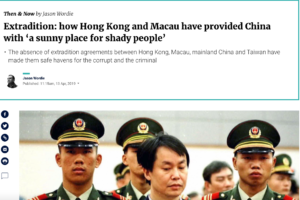
Secondly, Beijing does not need the law to rendition individuals it considers dangerous or a threat. It has done so already several times. Billionaires have been kidnapped from the lobby of the Four Seasons in broad daylight, booksellers have disappeared and re-appeared in China apologising for their so-called crimes, and one individual was even abducted from Thailand with no record of his exit from that country. If the concern is that Beijing will use the bill to politically target individuals in Hong Kong, the reality is far more sinister. Beijing can take anyone at will and there is nothing anyone in Hong Kong or anywhere else, can do about it.
It’s the economy stupid
The extradition bill was just a spark for discontent has been simmering for years with resentment building up over a long time. Welfare has historically been resisted in Hong Kong under both British and Chinese sovereignty. Economic policy established from in the 1970’s is based on laissez faire, or positive non-interventionism. This is a policy based on creating the regulatory and physical infrastructure to facilitate market-based decision making. Taxes are low and flat; the government has been allergic to deficits and redistribution is minimal despite huge and recurring annual surpluses or structural surplus.
Those conditions were ideal when incomes and standards of living were relatively low. Fundamentally capitalism requires a sense of optimism about the future. People need to believe their futures will improve provided they are willing to work hard. For a very long-time almost everyone in Hong Kong’s standard of living rose quickly, optimism was abundant, combined with a work ethic where even the lowest paid are prepared to work long hours seven days a week, everyone was rewarded. The city rapidly evolved from fishing village, into manufacturing hub and finally a services-based economy underpinned by what was for a very long time one of the world’s busiest port facilities.
Oh, i believe in yesterday
Without optimism, a market based economic system is going to develop problems. In fact, any type of economic system needs the people it serves to be optimistic otherwise it will fail. Ultimately in my opinion this is the root of the angst for many of the young protestors. The present generation, the students on the front line of the protests, have no sense of optimism (and therefore nothing to lose). This generation is the first that does not see a future ahead of them that was better than the past. Tomorrow will not be better than today and today is worse than yesterday. The stereotype is they live in two room apartments no bigger than 300 square feet they will never be able to afford to buy, in an expensive city where they will only ever be able to get by, and life doesn’t get any better than that.
Positive non-intervention taken to its logical conclusion in a city like Hong Kong has resulted in grotesque inequality and an economy that has essentially been cartelised. Hong Kong is dominated by property developers and financial services. Property tycoons and property owners have effectively captured housing policy in Hong Kong. The government depends on land sales and stamp duty from property transactions to generate revenue. As a result, there is a policy of creating and maintaining artificial scarcity of land. Homeowners whose primary interest is for the value of the major assert they own to continue rising in value are also unwilling to see those values decline. Put all those separate but equal sets of interests together and you get the Hong Kong property market, completely distorted with absurd valuations.
There was perhaps a time when Hong Kong may have been able to mimic housing policy in similarly land constrained Singapore where there is now 91 per cent home ownership. What Singapore did to deliver home ownership was to prevent interest groups from capturing policy and used the state where necessary to override property rights. The government in Singapore did not just create land banks for public housing, it actually built the houses as well. Contrastingly, housing policy in Hong Kong is about ensuring everyone’s financial interests are catered too except the interests of lower income young people seeking to take their first step on property ladder.
There was an attempt by the then chief executive in the aftermath of the Asian Financial Crisis to deal unequivocally with the housing shortage by dramatically increasing supply. The effort was mistimed and subverted by homeowners saddled by negative equity following a collapse in property prices who had no interest in housing supply being expanded at the time. This subversion took place during the first mass demonstration following transfer of sovereignty, when the government tried to impose a bill criminalizing sedition, which was in my opinion far more dangerous than the extradition bill. Sedition is an ambiguous term and such laws are designed to target political activism and curtail speech.
Mass demonstrations took place in response to the sedition bill and covertly the proposal to expand housing supply. For the first time in my life I witnessed widespread public dissatisfaction with the government in Hong Kong. A movement which I saw as being coopted by a powerful interest group to advance its agenda successfully. Both the sedition bill and the proposal to increase housing supply by 85,00 units a year were binned and one should not put too fine a point on that coincidence, one that few commentators refer to.
An inconvenient truth
Another source of dissatisfaction has been government spending and creeping corruption. Hong Kong has consistently run enormous budget surpluses as mentioned earlier. The city has a population of a little over seven million people and fiscal reserves of close to US$200 billion. In the last financial year, Hong Kong ran a record-breaking budget surplus of close to US$20 billion. As the population ages and fewer people contribute towards tax revenues, structural surplus is projected to turn into structural deficit about a decade before One Country Two Systems formally ends. Most protestors recognise Hong Kong has two trysts with destinies, one has passed and the second is set for 2047. The inconvenient truth of the second tryst was reported in the New Yorker, in a wonderfully titled piece “Bravery and nihilism on the streets of Hong Kong” by Megan Stack
The government does return some money to tax payers and the general public occasionally but has failed to make adequate social investments to prepare for an aging population. Benefits for the elderly are virtually non-existent and set at US$170 a month in one of the most expensive cities in the world. Many believed their children were their insurance in old age have found that to not be the case. They are now forced to live in sub-human conditions after a life time of back breaking work, featuring caged beds and filthy shared utilities.
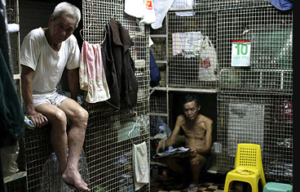
Health care spending has been stagnant. Hospitals have not been built, junior doctors and nurses are unhappy about over-work. The self-interested doctor’s guild has been complicit and fiercely protectionist, refusing to simplify the procedure for recruiting doctors trained abroad, forcing otherwise qualified practitioners even from developed countries to take equivalence examinations. What was once a relatively efficient public health care system where the cost to a patient (a friend whom I lost recently) of emergency airlifting and treating for Non-Hodgkin’s was US$130.
The retirement scheme or Mandatory Provident Fund (MPF) that requires 5 per cent matched contributions from employees and employers is insufficient. The contribution cap is set at a little over US$200 per month. A friend who has participated in the scheme since its establishment two decades ago and is now a partner and country manager for a global consulting firm says his scheme has delivered negative returns (thanks to the fees charged by the manager of the fund, not the market). Were he to retire today, the money accumulated would not last even three years. Those whose retirement is completely dependent of this scheme and current government policy have a bleak future ahead of them.
It’s all about the Benjamin’s
Whilst social spending has been almost nonexistent, the Hong Kong government has been profligate when it comes to infrastructure investments and there has been an alarming increase in corresponding corruption. The PRC’s has a vision for what it calls the Greater Bay Area. An economic and development policy connecting Hong Kong and Macau with nine other cities in the Pearl River delta to create a megalopolis with a combined GDP of US$1.6 trillion and more than 71 million residents. Connecting the region is meant to deliver network externalities, similar to those reaped by technology companies located in Silicon Valley.
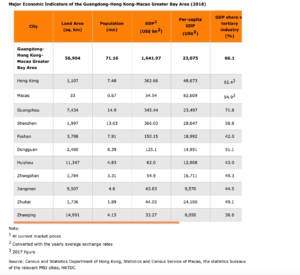
To what extent it will deliver on that promise at least in the short run is debatable. People and goods still cannot move freely between the cities on the mainland and those of Hong Kong and Macau. It is not possible, for example, to commute between Shenzen where rent is cheaper and Hong Kong where incomes are higher without having to pass through immigration. The flagship of this policy is the over budget US$20 billion Zhuhai bridge, partly funded by Hong Kong. The government is also spending vast amounts of money on other perennially delayed and over-budget construction projects widely considered to be white elephant vanity projects like a Cultural Centre.
There was also a proposal before the protests erupted, to reclaim land, create a connected island where affordable housing would be built. The estimated cost of this project is US$80 billion, almost the entire budget surplus and just an enormous amount of money for a city with a relatively small population. The MTR has also embarked on an ambitious expansion, seeking to connect every corner of Hong Kong and substandard contractor work has been discovered.
These projects are put out for tender. During British sovereignty construction projects typically went to British and Japanese companies, the latter renowned for their relentless focus on quality. Contracts are now being awarded to mainly to China based contractors and without making a direct accusation, it is not obvious the process of awarding contracts is completely ethical. All the spending on infrastructure has some tax payers asking whose interest is the government serving with all its spending? Is it those of Beijing and the cartel or is it Hong Kong taxpayers and its residents?
Rising corruption is perhaps the most alarming development. Corruption is cancer. Like all developing economies Hong Kong went through a phase of rampant corruption that was eventually contained. Following the Second World War as the economy grew and the population increased, corruption was widespread. By the 1970’s, British administrators sought to eliminate it and created the Independent Commission Against Corruption (ICAC) staffed by officers recruited from the UK who reported directly to the Governor. Despite intense initial resistance, the ICAC did an exceedingly good job creating a sense of fear amongst officials and police.
By 1997, the year sovereignty was transferred, corruption was almost unheard of and completely unthinkable. After the transfer of sovereignty, the Commissioner for ICAC became a Beijing appointment, still reporting to the newly created role of Chief Executive that replaced the Governor. Since the transfer of sovereignty, a former Chief Executive, former Chief Secretary of the civil service and the scion of Hong Kong’s largest property developer dynasty have all received corruption related prison sentences. For a city that used to have a reputation for clean government, the reemergence of corruption at the highest levels is not just shocking, but symptomatic of a wider malaise affecting the city, its loss of core values quite possibly linked to the change in sovereignty.
Hong Kong’s dirty little secret
The origin of the protest movement can be traced to policy originating during British sovereignty and accelerates during Chinese sovereignty and is not simply about inequality, housing, policy, corruption and the loss optimism. There is another theme running in tandem, the theme of identity. After transfer of sovereignty to the PRC, the first major event that occurred was the Asian Financial Crisis which resulted in recession. This was the first test for the government of the PRC and how it would respond to problems Hong Kong faced.
Until the crisis, the number of mainlanders visiting Hong Kong was constrained, freedom of entry and exit restricted. In order to mitigate recession, the PRC began to gradually loosen restrictions to help bolster the economy through tourism. I cannot date the change of policy beyond somewhere close to the beginning of the millennium. Up until then and for a good few years after, HK Chinese considered mainlanders to be less sophisticated and were generally looked down upon even though there was a strong sense of Chinese national identity during that period. I make this claim on the basis of many personal relationships rather than any empirical data-based study or published research.
What started as a trickle eventually turned into a flood. Mainlanders began using two way permits for everything from parallel trading to abusing and straining public services like healthcare. During the 2008 baby formula scare in China, Hong Kong found its shelves empty of their imported version of the product, snapped up en masse by mainland visitors either for themselves or to resell in China for enormous profits. Some mainlanders were not sensitive to cultural norms in Hong Kong and behaved in a manner considered socially unacceptable and all of that bred resentment.
Add the loss of prestige that accompanies Hong Kong’s economy declining from approximately 24 per cent of GDP before transfer of sovereignty down to around 3 per cent today. Mainlanders suddenly became the main buyers, helping inflate the already sizzling property market and the shoppers populating the luxury boutiques of Central and Tsim Sha Tsui district conspicuously consuming. In my subjective opinion, what was once a benign sense of superiority was challenged and the response was less than civil. By no means does or did everyone feel that way, though the exact number wouldn’t change the analysis much.
The response was sharp, mainlanders were branded locusts, a plague that swarms the city, unworthy of consideration as equal. This issue of identity and how many but not all Hong Kong Chinese see themselves relative to the rest of Asia with Japan and Korea as exceptions is Hong Kong’s dirty little secret. In fact, this is broadly applies to North Asia in general (look at aging Japan’s immigration laws). Something Mr. Jacob never bothered to discuss in his piece when he made the claim of unique identity and injury. Something Mr. Mukherjee if he has ever left his office in Cheung Kong Centre on a Sunday can see on full display just across the road from that building.
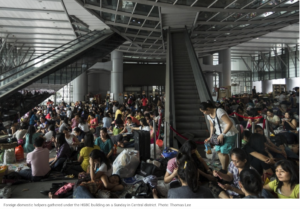
Where does this concept of racial hierarchy originate from? I can only provide a subjective answer for Hong Kong and not the rest of North and East Asia where it also exists. It started with the British, who coopted English speaking locals and Eurasians to serve in government, act as translators and conduits for business interests and were rewarded for their cooperation through favours. David Li’s grandfather established Bank of East Asia, casino tycoon Stanley Ho held a government sanctioned monopoly on the gaming industry in Macau are but just two examples. This policy of patronage is neither surprising nor is it unique to the former colonies of Hong Kong and Macau but It was the beginnings of the construction of hierarchy, at least in Hong Kong, and in my opinion.
The British political masters and Western business interests were firmly at the top of the hierarchy with the majority Southern Chinese just below. Everyone else from the rest of the world including South and South East Asia with the exception of Japan and now South Korea firmly placed at the bottom of the hierarchy. Except of course those minorities wealthy enough to be able to avoid coming into direct contact with the concept such as the Sindhi business community in Hong Kong which rubs shoulders with the elite, are employers and philanthropists.
So long as one is willing to accept hierarchy which is pervasive, cultural and will never change, one can go about their business and make a life for themselves. I refer to it as hierarchy because it is not so much an ideology but an ordering principle. There is no systematic denial of opportunity, no ghettos for ethnic minorities, businesses never care who pays the bill. But there was and is indignity and we never complained. Hierarchy was a fact of life, never challenged and as far as my family and our circle of friends are concerned, rarely discussed. We were middle class, did not have to contend with the worst and that attitude has shaped my personal view towards hierarchy. Compete, don’t complain.
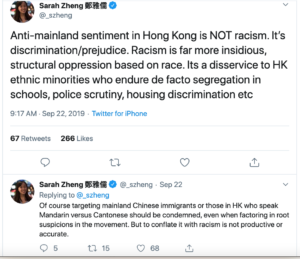
Compete don’t complain is a personal philosophy and it applies to every domain I see, social, institutional and intellectual hegemony such as hierarchy and liberalism politically and the notion of liberal hegemony internationally. If the worst things I have had to contend with in life have been a kicking in the back of a van from a group of Hong Kong police officers for no apparent reason and then dumped soaked in my own urine on the street. Another kicking in London the day of my arrival there for university. Wondering whether I was denied job opportunities because of my heritage. Affectionately nicknamed by colleagues and managers as an epithet at my first job. Learning an apartment for rent is suddenly no longer available after the landlord saw my name on the lease agreement, then I’m lucky. Things could have been and do get so much worse.
Whilst I obviously support the rule of law, the desire for the Basic Law to be respected and am even willing to get behind the peaceful demand for universal suffrage. I have to draw the line somewhere and that line is the claim to unique identity that has been injured, the source of all fragile nationalist movements throughout time. It is hard to be sympathetic to the feigning of injury and the imagined community. Like my own list of complaints made previously and for the first time, I see an awful lot of people complaining incessantly about a lot of things today and just not enough competition.
The minute I saw those complaints emerging in response to mainlander criticisms and insults, for the first time I felt a deep sense of contempt towards Hong Kong Chinese making those complaints. They may claim unique identity but injury I’m afraid is just a little too hypocritical for me. So much so, that this is the first time I have ever spoken at length about hierarchy in Hong Kong or anywhere else in the world for that matter. I do so because hierarchy I can tolerate, hypocrisy I cannot.
Someone from Hong Kong once asked rhetorically who wants to live under the rule of people who openly refer to you as cockroaches? He was referring to the mainland pejorative for Hong Kong Chinese. My response to that question was, I did and without ever complaining.
Journalists like Mr. Mukherjee and Mr. Jacob should know better even if their lived experience is not consistent. That their experience is not similar, or they are unaware of the concept only suggests to me they arrived well after I did, have little or no experience with non-English speaking locals, remain within their globalised bubble of English speakers, who are careful to avoid revealing their attitudes. And yet these journalists would presume to educate people on what is happening in a city I would be willing to bet large sums of money they do not fully understand.
Children of a lesser god
This is a city where the attitude by many Hong Kong Chinese towards the 400,000 migrant domestic helpers in a city of just over 7 million borders on modern day slavery and indentured servitude. Wages for migrant domestic helpers from across South and South East Asia, in one of the world’s most expensive cities was set at US$400 a month in the early nineties, it now stands at just over US$500. Unpaid wages, legally stipulated living accommodation not provided, passports withheld, food and mandatory days off denied, verbal and physical abuse, performing jobs not permitted by contract and working hours well in excess of the maximum number, all in breach of the law.
No matter how long migrant workers have lived in Hong Kong, they will never be able to achieve residency or have a set of rights. Their legal status at the whim of an employer who may choose to terminate their contract whenever they desire and force them to leave the city within two weeks. Some, perhaps many domestic helpers are lucky to have employers who treat them as humans. Most will have experienced some if not all that has been mentioned and only the worst cases ever get punished. With 400,000 on two-year contracts today, how many migrant workers will have passed through Hong Kong over the decades and how many were exploited? According to Hong Kong’s Immigration Department, the demand for migrant workers on temporary visas with no rights is projected to grow to 600,000 by 2047 in order to deal with an aging population.
Why do I selectively draw attention to migrant domestic helpers in Hong Kong? Because if the institutional attitude towards the most vulnerable minorities in the city is to maintain suppressed wages deny rights and not enforce the law because it is useful to do so. Underpinning that attitude is they are unworthy, how likely is it that cultural attitudes are different? People not at the top of the hierarchy who have lived in the Middle East, the ones I know anyway are likely to recognise this concept and I suspect should claims start emerging of injury would be feel as much antipathy towards them as I do.
And yet it would appear people in Hong Kong including stereotypical woke liberal expats fully aware of all of this and say they are willing to sacrifice their lives for the rights of the people of Hong Kong, but unwilling to do the same to end indentured servitude. Point this out to them, they reply with a shrug and say they have no obligation, because apparently a few tweets on the subject indemnifies them from hypocrisy. Human rights for some, but not for all. Decency for you, but not for me.

I put forward this question of injury to Mr. Mukherjee following his tweet and asked why he did not see fit to tell the whole truth about identity in Hong Kong and its dirty little secret. Even if he himself has managed to avoid it, how many have not? His response hours later (assuming my question was even read, which I doubt) was to retweet the link, claiming the piece he was using to educate South Asians was definitive, which I found incendiary.
Had Mr. Mukherjee not done so, I would have gotten on with life, dismissing him as I have so many journalists and academics covering Hong Kong. Individuals more interested in ideology, projecting their normative preferences on to their audiences, and shaping their opinions rather than providing objective coverage or any sense critical thinking. Instead, I chose to write a post I know will leave me vulnerable to attack by those who refuse to listen without prejudice.
If one has managed to read this far, I want to thank you, it couldn’t have been easy and I apologise for the small outburst that reveals my true motivation for this post.
Fuck the police
Marginal violence did its job but has backfired in my opinion. Whilst it did achieve the goal of eliciting support from the public and the media, that has not come without cost. Frontline police officers tasked with defending government policy they had no role in shaping have been vilified and that has resulted in a hardening of their attitude towards protestors. They are no longer concerned about public opinion nor does it appear they care thousands film them using smartphones during their acts of brutality and post those acts for the world to see.
Much has been written about what was once considered to be “Asia’s Finest” and their tactics. Many authors claim the brutality is the result of a mainland policing strategy. Some even claim the Hong Kong Police Force is now made up of members of China’s People’s Armed Police. There is no denying that excessive force has been used. Where did these tactics originate? They were in fact first developed in response to rioting and bombings in Hong Kong during the Cultural Revolution when a British administration fearful of events on the mainland spilling over into the territory were forced to develop a counter response to violent mass demonstrations and bombings.
The suppression of riots in the 1967 so impressed British police the tactics were adopted by the police force in the United Kingdom to deal with social unrest in the 1980s. British police were heavily criticised for their handling of the Brixton race riots and turned to an unlikely source for assistance in developing a response. Hong Kong which had developed a doctrine consisting of the liberal use of force that is now seen globally, from Paris, to Moscow, London to Los Angeles. These tactics were first deployed by British police during the miners strike and the now infamous Battle of Orgreave and those tactics were born and bred in Hong Kong.
The Hong Kong Police Force is unique amongst government departments in the city in that it is the only department that did not undergo a full process of localisation in the run up to and post the transfer of sovereignty Many senior officers on the force remain British. Whilst recruitment of foreign civil servants ended in Hong Kong by 1994, The HKPF allowed British junior police officers to remain and continued to renew their contracts, some of whom now serve in the senior most positions on the force. These officers were trained to handle unrest in the UK before arriving in Hong Kong decades ago and if they were not trained there, then they certainly received training in Hong Kong where those tactics originate.
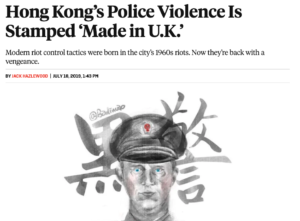
In fact, the first major faux pas, the use of tear gas and rubber bullets in the central business district was ordered by a British police officer, not a local officer and certainly not by anyone from the mainland. That decision that will probably come to be rued as being the first major turning point because it unleashed a torrent of opprobrium towards the government. Indeed, riot police on forces all over the world charged with having to quell social unrest routinely demonstrate a penchant for brutality because the reality of the job is not one of restraint. Violent and marginally violent protestors generally do not respond to please and thank you. The argument such tactics are uniquely Chinese and have infiltrated the HKPF is not consonant with reality nor consistent with how riots are handled in Paris, London, Moscow, Ferguson, New York and Los Angeles.
Paris yellow vert movement week number 45
One journalist at a large news organisation’s bureau in Hong Kong presumably under instruction not to comment publicly, made his first and only online comment I am aware of the morning after the three-day shutdown of the airport and resulting mob violence. His comment something to the effect, that whilst he condemned the brutality of the Hong Kong Police Force, were the same thing to have happened at any other major airport, there would be bodies being cleaned off the floor the morning after. Mainstream media and the public howls at every act of police brutality and scoff at the counter response that the police have been restrained. Show journalists and protestors how violent protests are dealt with everywhere else in the world and there is no response or they say they hate police everywhere.
Hong Kong’s unique status as a cosmopolitan global financial centre under Chinese sovereignty means the protests and the response to them are under a microscope. They come at a time when China’s political system and trade policy is being heavily criticised and every opportunity to undermine it will be used. This means Hong Kong is constrained in its ability to deploy the same level of force afforded to countries with democratic systems. Policymakers in China much as they probably would like to deploy lethal force to quell unrest, know that at this moment in time, it can only be used when all else has failed because the consequences are too high.
All states will resort to force to deal with sustained violent social unrest and there is a reason. The most common definition of the state is Weber, and his monopoly of violence. Challenge the monopoly and the state will meet that challenge head on, without question and in every circumstance in every place and in every time. In democracies, after order has been restored, the officials tasked with carrying out the unpleasant job of putting down the protests are typically sacked and an inquiry is undertaken presumably as some form of contrition. Finally, after much handwringing, the media eventually loses interest, the discussion moves on and almost everybody forgets.
The thoughtful believe eventually the police in Hong Kong will defect which is the hallmark of a successful non-violent movement. So far there have been no public defections or resignations in protest though the possibility of this in the future cannot be ruled out. As stated earlier, if anything the response of rank and file officers to vilification and doxxing has been to harden. There is a secondary claim that the police have been infiltrated by members of the People’s Armed Police and whilst this too is possible, no compelling evidence exists that this has taken place yet.
Academics have made this claim citing unnamed sources amplified on social media by some fairly disingenuous China hawks chief among them is investor Kyle Bass. Mr. Bass does not hesitate to use the internet to spread malicious conspiracy theories that time and again have proven to be false. The only evidence are unsubstantiated reports and a video allegedly showing an officer speaking in Mandarin not Cantonese. The video has been debunked by protest sympathizers fluent in Putonghua. Tactically, deploying mainland officers is also highly questionable, though rational policy is not always the hallmark of government.
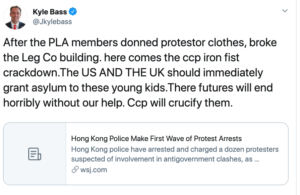
Nevertheless, If the cost of intervention is considered high enough to effectively deter it at this stage, presumably that would apply to both public and covert intervention? The latter would inevitably be leaked, because few governments are competent enough to run a conspiracy that is not discovered eventually. Well that is my theory. These unsourced reports and debunked video are the analogue of Beijing’s claim that there is foreign government involvement in the movement. Both must be treated carefully because both claims are quite believable and are used to legitimize violence and escalation to their intended audiences.
Strategies by both police and protestors have evolved and continue to evolve with every protest event yielding some new development. What began as marginal violence is now violent confrontation. The police initially reticent to charge have begun brazenly doing so and firearms in a society where gun ownership is near zero and gun violence nil, have been discharged. Police have begun to infiltrate the movement, dressed as protestors and making arrests. Protestors suspected of being police and quite likely to be so, have been beaten.
When protestors have been arrested during confrontations, radio frequencies used to coordinate their activities are switched to prevent the police from learning tactics. Tear gas is now inconsequential with gas masked protestors hardened to their effect and coming up with innovative ways to neutralise the canisters. Water cannons recently deployed spraying dye to identify and make arrests have been countered by protestors coming prepared with spare changes of clothing.
Most impressive is the versatile use of the humble umbrella as an instrument of offense and defense. It is used as a baton to beat back police, a shield, to protect against pepper spray and to bat away tear gas canisters. Rows of open umbrellas are used to obscure protestor activities from police during confrontations. Umbrellas are used to hide protestor identities as they pass through areas where there are overhead cameras. Three months ago, if someone had said the umbrella could be such an effective weapon in urban guerilla style warfare, it would have seemed unbelievable. The umbrella has truly earned its place as the symbol of the movement, however should live bullets ever be fired at the protestors, the umbrella will provide no defense.
Welcome to the jungle we’ve got fun and games
Which brings us to Beijing’s strategy for dealing with the protest movement and the question that most people have been contemplating for quite some time, whether troops will be unleashed on civilians and the demonstrations violently crushed as they were in Beijing in 1989.
The first thing that should be made clear, there is no doubting China’s territorial sovereignty over Hong Kong and any and all claims of independence are illegitimate. Hong Kong Island was ceded in perpetuity to the British following the Opium Wars at the treaty of Nanking in 1842, followed by the signing of a 99-year lease for the surrounding New Territories granted in 1898. British Prime Minister Margaret Thatcher attempted to extend the 99-year lease set to expire in 1997 during the early 80’s on a visit to Beijing where she met with Deng Xiaoping, who rebuffed the overture.
Because Hong Kong is incoherent without the New Territories, Mrs. Thatcher by her own account decided the territory would have to be returned to China in the wake of a tacit threat that force would be used were the then Great Britain to refuse. In 1984 the joint declaration was signed by both states, re-affirming Chinese sovereignty over Hong Kong and what would come to be known for the next fifty years post 1997 as the Hong Kong Special Administrative Region (HKSAR).
Hong Kong under British sovereignty had a political system of functional constituencies. This is a hallmark of colonial systems of government. The system in Hong Kong was borrowed from the Portuguese who held sovereignty over nearby Macau. As its name suggests, the system is one where special interest groups such as finance or law, were and are represented in the legislature either by way of individual or legal entity. What that means essentially is Hong Kong has never been democratic. Laws were debated and passed in accordance with those interests.
A day late a dollar short
During the final years of the British administration, as transfer of sovereignty approached, Chris Patten, Chairman of the Conservative Party in the UK lost his seat during the General Election. His friend, British Prime Minister John Major, whose victory Mr. Patten secured in that election at the expense of his own seat in Parliament, offered him the consolation position of Last Governor of Hong Kong for a five-year term ending midnight June 30th 1997. Even by today’s standards the job paid well, most if not all expenses are covered, income is tax free, and Government House, as one would expect, is a magnificent official residence. The position was a great place to be kicked upstairs too but that is not what happened.
Typically, the governor is a symbolic role given to a bureaucrat or sinologist, whom generally, with certain exceptions refrained from direct involvement in policy making. Lord Patten as he is now known, accepted the role, on condition he could approach the job as he saw fit and his friends in Westminster including the Prime Minister would provide backing. Mr. Patten arrived in Hong Kong amid great expectation and set about approaching the job as a seasoned politician would. He toured the streets on foot, tried to get a sense of the people and famously ate a moon cake, all of which deeply ingratiated himself with the public who were used to governors that maintained their distance and they responded, affectionately renaming him Fat Pang.
Unfortunately for Mr. Patten, he arrived a day late, perhaps a dollar short. His intention was for the British to leave Hong Kong with honour. Mr. Patten often said honour had been lacking from previous British colonial exits and a dishonourable exit was something he was determined to avoid repeating in Hong Kong. Mr. Patten sought to add 20 directly elected seats or one-third the total to LegCo. He ran into opposition not just from Beijing which immediately went on the offensive, branding him “The sinner for a thousand years” amongst many other insults but also by business interests.
In an interview with the Guardian, Mr. Patten recalled a visit to a psychiatric hospital a few weeks before Hong Kong’s sovereignty was transferred back to China. The last governor of Hong Kong says he was approached by a patient wearing a business suit
Governor Patten, could I ask you a question?” the man inquired. “You always tell us that Britain is the oldest democracy in the world. So could you explain to me why you are handing over Hong Kong to the last great totalitarian regime without asking the opinion of the people of Hong Kong?
In spite of their location, it was, Patten says, “the sanest question in Hong Kong”.
In order to pass electoral reform, Mr. Patten needed to win over the various functional constituencies. By far and away the most important was the Financial Services constituency, a proxy for HSBC referred to in Hong Kong as simply The Bank. Chairman of the Bank at the time, Sir William Purves decided the future of Hong Kong and the bank he chaired lay with China and the Financial Services representative in LegCo voted against Mr. Patten’s reforms. Nevertheless, the reforms narrowly passed, an election was held in 1995, but as soon as sovereignty returned to China two years later, those reforms were reversed immediately.
We’re just good friends
HSBCs response to Mr. Patten’s proposed reforms and indeed the response of all international businesses operating in Hong Kong to the impending transfer of sovereignty in the run up to 1997 and their response to the protests of today has been fascinating. The very same debates and arguments surrounding the rule of law, where the interests of these companies lie, began the moment the Joint Declaration was signed and continue to this day. These companies face a dilemma between serving the interests of their shareholders whilst trying to avoid alienating their customers and the public at the same time.
This is not the first time British Banks and trading companies with legacies from the opium trade such as HSBC, Standard Chartered, Swire and its subsidiary Cathay Pacific, HK Land, Jardine Matheson, China Light and Power and today what is known as CK Hutchison and now controlled by Li Ka Shing have had to navigate the complexity of mainland and local politics. Most of these companies chose to remain in Hong Kong, continue to invest and step up investments on the mainland. US companies did the same, in fact by 1993 American residents outnumbered British residents in the colony and US companies also had to contend with a similar set of issues, worrying about the rule of law and the enforcement of contract.
Jardine Matheson, controlled by the Keswick family and still very imperial in its outlook when the Joint Declaration was signed decided to re-incorporate in Bermuda, shift its Asian listing to Singapore from Hong Kong and diversify away from the city, limiting or abstaining from investing in China. Jardine’s contemporary, the Swire Group did the opposite, chose to remain listed and invested in the city and stepped up property development in China. Whilst Jardine has investments across the rest of Asia Pacific region, Swire which chose to bet on China instead, continues to dwarf Jardines in terms of market capitlisation, but that has not been cost free.
Swire, the majority shareholder in Hong Kong’s flagship airline has found itself caught up in the middle of the crisis after employees went public with their support of the protestors. Beijing retaliated by demanding and receiving the resignation of both Cathay Pacific’s Chairman and its Chief Executive. China has used its economic leverage over Hong Kong’s largest companies to ensure they toe the line. 500 business leaders and executives from Hong Kong were summoned across the border to Shenzen where they were made to make a public declaration of loyalty.
Western journalist say the use of this leverage is not acceptable. Personally I do not see any difference between the China forcing companies to obligate their employees to act in their interests any different to the United States use of sanctions in Iran. Both effectively use their economic power to punitively punish companies who fail to comply with their wishes in order to achieve political objectives. Whether as a liberal I believe either policy of punishing individuals is appropriate is besides the point.
I will always love you
One of the reasons the UK has said very little on the events unfolding in Hong Kong. Aside from the fact that it is preoccupied with leaving the European Union and wants to ensure it does not alienate China so that future trade agreements are possible. Britain’s record in the city was anything but democratic. From 1843 until 1985, Hong Kong was effectively a dictatorship with the British appointing a governor and his council. The system of government was perhaps best described as a benevolent autocracy, one whose most important contribution was establishing the rule of law.
Some people in Hong Kong have chosen to wave the colonial or British flags as part of their protests reminiscing about a time that apparently was freer and more democratic. Authors, politicians and diplomats suggest freedoms guaranteed under the basic law are being undermined and reversed. This is either amnesia or they are choosing which parts of what has happened in Hong Kong since the return to Chinese sovereignty to remember and wish to transmit in a post-truth world.
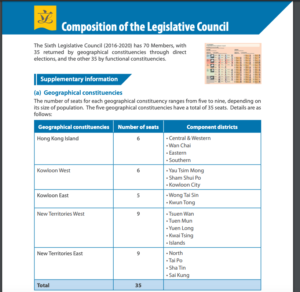
In 156 years of British sovereignty only one democratic election was ever held, taking place in 1995 just two years before British sovereignty ended. In 22 years of Chinese sovereignty, there have been 7 democratic elections. Under Chinese sovereignty the number of seats in LegCo have been expanded from 60 to 70 seats, with 35 of those seats now directly elected. In fact, during the 19th century under British sovereignty there was even an extradition agreement with Imperial China known as the Chinese Extradition Ordinance. There is very little doubt it came with fewer conditions attached and less rigorous checks and balances.
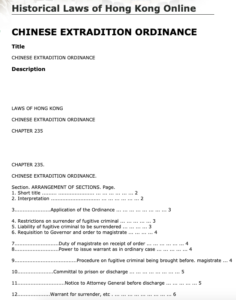
All you need is love
Interrogating the claim that civil rights are under attack in Hong Kong from a totalitarian regime on the mainland determined to impose an Orwellian government, one need only look at a Court of Final Appeal (Hong Kong’s highest court). In 2017 a gay civil servant took his employer, the Hong Kong government to court for denial of spousal privileges including medical and dental benefits. Angus Kwong, was also not permitted to file joint income tax returns, because the Hong Kong government did not recognise same-sex marriages and therefore such privileges were denied.
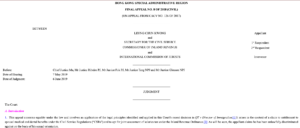
Mr. Kwong took legal action against the Hong Kong Government and the Inland Revenue Department seeking to force them to recognise his marriage and obtain spousal privileges for his partner. Mr. Kwong fought all the way to the Court of Final appeal over two years, in a case which the government kept losing at each stage and appealing. Mr. Kwong’s spousal privileges were ultimately upheld by the Court of Final Appeal which ruled the Hong Kong Government did not have the right to refuse recognition of same-sex marriages that were entered into legally abroad.
There are 49 states considered to be part of the Asian continent. In 21 of those 49 states, homosexuality is still illegal. In many states where homosexuality is legal, laws criminalizing it were never drafted to begin with, including North Korea. Only 2 jurisdictions recognise same-sex marriages, Taiwan, and now Hong Kong, which suggests two things, Hong Kong respects individual rights and more importantly the rule of law endures. Highlighting this particular case is indeed selection bias, but no different to the kind of bias demonstrated by mainstream media narratives. More importantly the ruling came in June, just as mass demonstrations kicked off.
The mainstream international media narrative is there has been an erosion in Hong Kong of civil liberties. The mainland is seeking to exert greater sovereignty through the introduction of an extradition bill that would end up being used for nefarious purposes. People are apparently less free today in Hong Kong than they were under the British because of the political renditions, kidnappings, self-censorship and a climate of fear. The government response has been vicious and brutal, suppressing protestors through tear gas, rubber bullets and bean bag rounds.
There is a counter narrative, one not convenient to the manufacture of consent of domestic audiences casually watching events unfold and perpetuated by the likes of Mr. Mukherjee and Mr. Jacob. The government Hong Kong is currently in the grip of its worst political crisis since bombings and protests associated with the Cultural Revolution in 1967. So far, two maybe three live rounds have been fired in the air and zero deaths despite petrol bomb and baseball bat wielding protestors who would have been shot on the spot in the United States. The courts are issuing rulings against the government upholding civil liberties they reject. More importantly the media has been allowed to cover events without censorship or fact checking for that matter.
Try coming at a cop in the US with a baseball bat and see what happens
How dare you?
Local media outlets openly hostile to the government like Hong Kong Free Press which claims to be free and independent journalism as its tag line, declining to mention that it is also completely agenda driven too, operates unrestricted. Neither HKFP nor its contributors have been victimised by the government or censored. We cannot say the same thing about HKFP editor Tom Grundy who has doxxed someone that naively documented the inconvenient truth because they dared to do so using the tactics of fake press credentials
He’s a clueless kid
Freedom of speech reigns supreme in Hong Kong, in its moment of need. That people can speak freely does not make them truthful. When the topic of the moment was what emergency powers are available to the government, journalists immediately engaged in fear mongering. They speculated that an internet shutdown was imminent. If a financial centre, serving global investors trading virtually every dollar denominated asset class were to decides to shut down the internet, it would not come as a surprise. The warning signs would be flashing, punctuated by live bullets, soldiers in the street and curfews.
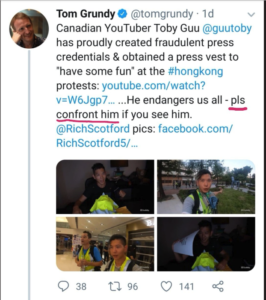
Mission accomplished
Some academics have exaggerated to the point of absurdity claiming Hong Kong is in a state of martial law, apparently unaware the wealthy in Stanley continue to sip their mai tais in beach front bars watching the sun go down. Martial law they say? Political activists have been arrested but were put in front of a judge and released on bail within hours of arrest and permitted to leave the city. So far there have been no deaths except by suicide or accident, live bullets are the rare exception not the rule and there is no curfew. Most importantly the definition of martial law is in its very name, it means military have taken over the function of domestic security from the police. This is not what is happening in Hong Kong today.
Journalists complain they have been targeted by police during coverage of violent confrontations with protestors hit by tear gas from the police, the story they choose to file. Unless you were watching events daily you would never know that journalists have caught fire, inadvertently hit by Molotov cocktails lobbed by the protestors and tear gas cannisters the protestors were trying to hurl back at police. One group guilty of accident, the other group committed a crime.
There are two sets of narratives only one makes headlines, whilst the other is all but ignored. One will have you believe that Hong Kong is in the death grip of a python sucking the very life from it. The other apparently celebrates love of all kinds and sings halleluiah when it comes to freedom of speech. One narrative paints the leaderless protest movement as valorous. heroic and incapable of malice. The other suggests there are people in Hong Kong who do not sympathise and are sometimes violently silenced when they try to speak their minds.
Can’t go wrong with a bit of mob violence
Smile for the camera, remember try and look natural
Smooth criminals
The fight in Hong Kong is ostensibly about democracy and freedom. A system designed to legitimise government by providing authorisation to those who would be rulers by those who will be ruled at the ballot. A system of government that has descended with few exceptions globally into outright political, ethnic or religious majoritarianism. In the United States and around the world, conservatives, who rail against woke culture at home are suddenly so very woke abroad.
The protest movement in Hong Kong and freedom should be supported at all times they say, and too hell with the consequences because the benefits far outweigh any costs. In the very next breath these people I’ve conversed with tell me they are afraid to openly state their name and political preferences for fear of persecution and their families, completely unaware how that sounds coming from a citizen of the world’s oldest democracy apparently built on life, liberty and the pursuit of happiness. The complaint is safe spaces, doxxing, shaming and cancel culture. That just doesn’t sound very free to me.

In the UK they claim the decision to leave the European Union is the will of the people declining to mention that decision was marginal at the time. These same people choose to point to constituencies won rather than actual number of votes cast because that statistic best reflects the will of the people. In India, Hindu majoritarianism reigns supreme, completely unassailable and is now attempting to reshape the country in its image bent yet again on projecting the fragile claim of injury. If I feel antipathy towards democracy, it’s not because I am disappointed with political outcomes, it is because in the jungle, only tyranny roams free.
Initially I was incensed by one dimensional coverage of events in Hong Kong by mainstream international media. For a time, I really did fear tanks would roll and blood would spill. I really was afraid the city I grew up in would permanently change. I felt a deep sense of contempt for celebrity Singaporean writers like Melissa Chen, ignorantly sitting in the security of their safe spaces critiquing post-colonial theory wholly irrelevantly. Authors with no skin in the game writing op-eds glorifying a movement they know nothing about. Individuals on social media encouraging protestor escalation without any risk of having to deal with violent consequences. Casually writing or tweeting about political events in a city they probably spent no more than few days in and would be unable to find it on a map.
This privileging of democracy and universal rights by both Western liberal and conservative elites and the masses is a source of deep antipathy for many (obviously not all) intellectuals in Asia. Kishore Mahbubani perhaps the most well-known of them has made this the central thesis in many of his books and lectures, arguing the system has been corrupted. And there is a lot to be said for the argument that Asian values are different from those in Western Europe and North America.
Singapore’s founding father Lee Kwan Yew never really had much time for universal rights and was no fan of Mr. Patten’s attempt to introduce democracy in Hong Kong so late in the day. Malaysia’s formerly rabidly ethno-nationalist Prime Minister Mahathir Mohammed, South Korea’s US backed military junta that violently suppressed demonstrations or the authoritarian KMT regime in Taiwan guilty of White Terror until the mid 80’s. This great and vast continent of ours containing just over 4.5 billion people has a long and dramatic history filled with violence and bloodshed and is truly the land of hope and glory. Whatever political arrangements are eventually arrived at in states across the continent, our values must remain our own. Don’t tell me we need to be free, don’t tell me to kneel before anything other than only currency in town. Power to the people and no prince can survive without their consent period.
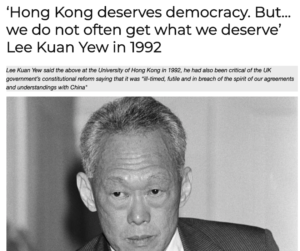
She’s an easy lover and I’m just tryin to make you see
Most people with decades of experience living and doing business in Asia and who ask themselves these kinds of questions will know the western societal concept of atomised individuals with a set of universal rights is not automatically aspired to by everyone. Many countries in Asia and indeed around the world are societies where extended families, culture and group identity are sacred, privileged over individual identities and their rights. More importantly in those countries many are willing to subordinate their individual rights to the state in return for order. The modern version of the Hobbesian social contract. In some societies people are even willing to subordinate their rights to religion, something which even I found surprising when I discovered that.
Whether any of this is desirable really is beside the point. It is not for people to look at societies they do not fully understand, from a distance, and lecture them on the good life. One that cannot be objectively defined and agreed upon even in democratic societies and is the source of political division. Many journalists and academics come to Asia and begin making normative projections on these societies immediately. They tell their readers in the New York Times, Wall Street Journal or Foreign Policy Magazine about the wickedness of the regimes they cover and the oppression people are living under and how evil these systems of government are.
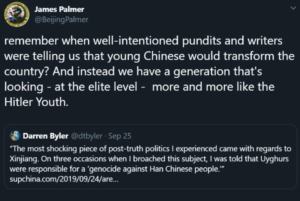
Many of their readers make assumptions about authoritarian regimes never having visited or spoken to anyone that actually lives there at most only those that fled. When their sources of judgement are questioned, they respond with, they learned everything they need to know from George Orwell. Six centuries ago Nicolo Machiavelli essentially claimed the liberal state cannot guarantee security lo and behold we now all live in a global kind of security state. We don’t know what global security agencies are doing, what technologies they have developed, and what information is being shared with them, by them and between them.
Private companies may well refuse to cooperate but well-funded and determined security agencies will not ask permission if they a fear clear and present danger. There has been a breathtaking roll out of CCTV globally with almost no questions asked, not even a pause so I can just catch my breath for a single moment. Facial recognition is in store now, companies are actively pitching it to governments all over the world. Data is being collected, analysed and monetised. The surveillance state in democracies is privatised, decentralised and opaque but is as robust as any. The saying goes Orwelll was right, he just got the date wrong.

When Edward Snowden revealed to the world the US government was spying on its own citizens, hell hath no fury like the liberal state scorned. Snowden fled the US first to China and then Russia. Fortunately for Snowden back then, there was no extradition agreement between the US and China otherwise he would be sitting in a prison cell today. The great irony of Snowden is it took an authoritarian state to provide sanctuary from a liberal state incensed that his revelation exposed the myth that democracy and freedom are concomitant.
I know Kung Fu
Journalists and academics make some dubious and unsubstantiated claims about what the majority desire in authoritarian societies. Chief among them the numerous China experts that have mushroomed recently, some of whom are fairly disingenuous about their motives. The kind that have read some or all of the required reading list. A decade long stint teaching economics at a Chinese business school, maybe had a kid or two along the way, perhaps even picking up a little bit of the language. All this gives them deep insight into Chinese cultural thinking and the authority to use their academic credentials to co-opt an audience that takes them seriously and they use to further their agenda.
This is not to say that people in China do not yearn for what we believe to be freedom. Obviously, some, perhaps many do. I’m also fairly confident there are some, perhaps many, that accept the social contract with the CCP. One where authorisation was granted initially to unite, then order and finally deliver economic growth. Implicit in that contract is the subordination of universal rights to the state. The reality is it’s probably not binary, but for simplification, whether one group outnumbers any other is impossible to say.
Liberal democracy evolved over a period of centuries from absolute sovereignty and arbitrary law. Despite what Stanford academics with books to sell and high-profile media careers tell us about the six killer apps of prosperity that are open source and instantly downloadable. Liberal democracy or government limited by universal rights and the rule of law needs to evolve, it cannot be imposed, just ask the Iraqi’s. In fact, the claim that liberal democracy represents the End of History is now widely mocked and the author of that book’s latest work is rather unsurprisingly focused on identity.
Hit me baby one more time!
The first step in the evolution of liberal democracy was not a set of universal rights that limited the sovereign, it was property rights demanded by elites to prevent arbitrary taxation. Democratic and economic competition can be used to prevent rent seeking but even that is debatable. Ultimately, the only necessary components of sustained prosperity for societies are enforced property rights and political stability. Civil and human rights are fungible and discretionary.
Fareed Zakaria, before his re-incarnation as Davos man, showing up every Sunday morning to re-package neo-liberalism wrote a rather controversial and highly cited paper less than a decade after the fall of the wall. The paper, made the rather startling revelation that whilst democracy was indeed spreading globally as was predicted following the collapse of the Soviet Union, it was not the kind of democracy consistent with US liberal hegemony. Instead Mr. Zakaria correctly predicted the rise of what he termed illiberal democracy, one not predicated on constitutional liberalism and since then a new term has been added to the lexicon, democratic recession.
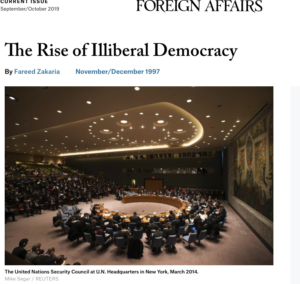
Mr. Zakaria was making a point conveniently being ignored for the purposes of this post. Nevertheless, whilst Mr. Zakaria never made the argument in the paper, fundamentally, a political system only really needs to do two things effectively. Deliver legitimacy and enforce property rights. Everything else, such as liberal constitutionalism are ideal but not essential for prosperity. Legitimacy is conferred on the rulers by the ruled at the ballot, and property rights can be enshrined and enforced constitutionally without the need to do the same for civil and human rights.
So long as living standards continue to rise across the board, in general the population tends to be content with this kind of political arrangement. Mr. Zakaria’s paper is abundant with examples, but perhaps the most relevant comparable to Hong Kong is Singapore. Singapore has a smaller population more ethnically diverse and is on a per capita basis wealthier than Hong Kong though both economies are similarly sized with the Hong Kong economy a little larger.
A tale of two cities
Singapore’s economic model is more diversified than Hong Kong, built on manufacturing, finance, commodities, shipping and technology. The city state has had one party rule since independence, through universal franchise and property rights are enshrined and enforced, though when necessary the state is willing to override them. Under Lee Kwan Yew Singapore had a more authoritarian bent that has moderated since his death. Nevertheless, civil liberties are constrained in Singapore, much more so than in Hong Kong.
Freedom of speech and press in Singapore is guaranteed and also limited by its constitution. There is no data protection and the government has the right to undertake individual and mass surveillance. Corporal punishment through caning is still meted out to this day, male homosexuality remains illegal, political and religious content is censored and assembly requires police permission. In comparable Hong Kong, even after transfer of sovereignty, all of that is unthinkable and yet only one of the two cities faces its worst political crisis since the Cultural Revolution and only one of those cities are journalists and academics arguing for civil liberties to be respected.
What can be inferred from this contrasting tale of two cities? How do we account for this discrepancy? Is it believable what is happening in Hong Kong today is a crisis of constitution and not a crisis of currency? What is happening in Hong Kong is probably best described as a series of unfortunate events, combined with a cascading series of policy botching, coupled with escalating violence, encouraged by all kinds of well-meaning and malevolent observers from all over the world, located smack bang in the middle of a great power rivalry.
That there is an assumption that the desire for our version of freedom is universal and foreign policy must be shaped around that assumption is not so much surprising as it is disturbing. It’s not surprising because costly foreign policy must have the consent of domestic audiences and that consent must be manufactured. This is why the language of morality is used. It is impossible to sell expensive foreign policy, that may one day involve war in a liberal democracy to the masses using the language of power. Liberating oppressed people from tyranny is something most people can support and the rhetoric is timeless, almost clichéd.
China hawks either deny that some, perhaps many, are willing to make the tradeoff between order, the wealth created from that order and personal freedoms, or they omit it from their rhetoric. They claim the enemy is not the Chinese people who are heroic, instead it is the CCP who oppresses them trampling all over human rights. The state steals intellectual property, forces technology transfers, has asymmetrically benefitted from free trade and is revisionist seeking to shape the international system in its image.
All of the above is probably true to some extent. The same is also true of every great power that has ever tried to or has achieved hegemony since the beginning of the modern state system including the United States. In the United States it was manifest destiny followed by Western hemispheric regional hegemony codified by the Monroe doctrine. Those who point the finger at authoritarian regimes committing mass murder and atrocities on their own people will never acknowledge the same kind of atrocities perpetrated by the United States on other countries and even its own people. No state since 1945 has been more violent than the United States.
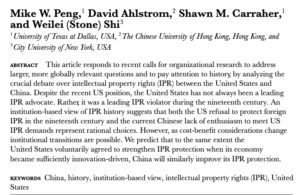
Inevitable accusations of being a China apologist and anti-American will flow. Those accusations will have no attention paid to them. It is not useful to judge predators for taking down prey. Apologies are unnecessary, they do not change reality. Demonising the United States for hegemonic behavior or China for being revisionist serves no purpose beyond helping those that need to, feel good about their values. Morality is useless as a description for state behaviour nor predicting how states will behave in the future and how to objectively arrive at a policy response.
China is a state on the brink of achieving regional hegemony in East Asia, the significance of which is not lost on policy makers from Canberra to New Delhi, Tehran to Rome and Moscow to DC all of whom are in the process of constructing their response. A great power like China will quite rationally seek to exert sovereignty over all the territory its claims. In the case of Hong Kong which lacks strategic significance to any other state, and where the claim of sovereignty is uncontested, no one will ride to its rescue and no one is coming to help.
Hong Kong is now a pawn in this tragedy of great powers. One in which there is a battle for pre-eminence in Asia and one that neither side will hesitate to sacrifice should the need arise. The coverage of the city by the media is no longer about rights and obligations. Journalists may or may not be aware what they are doing is part of a wider struggle for primacy in the region. One which will decide who will ultimately control the institutional levers of powers, in what will inevitably be the most important continent on the planet one day, if that is not the case already.
For those who believe the motives of everyone involved in what is happening in Hong Kong, how it is being covered and the political rhetoric are pure. Senator Marco Rubio gave an astonishing speech recently, the first American politician to publicly articulate a sense that Socialism with Chinese characteristics is an existential threat and must be dealt with. The Senator’s speech was in response to another astonishing speech given by Huang Qifang a high-ranking member of the CCP critical of US policy but for the first time making the claim of the inherent superiority of Socialism with Chinese characteristics over Capitalism.
Both speeches were astonishing not because of what was said by either politician, rather they were the first time these ideas were publicly stated by politicians. Both speeches were rhetorical and full of hyperbole, a struggle between good and evil, rather than a struggle for power. The fear is that China will seek to alter the International system to its advantage, which it will and is already in the process of doing. Whether it changes the system in fundamental ways beyond how much influence the United States is able to exert is unlikely. China’s behaviour is natural and to be expected as is US resistance to the idea that its leadership is being challenged and will do everything it can to frustrate and deny that challenge. The point is Hong Kong is now simply a pawn in this game. For me personally that is the real tragedy.
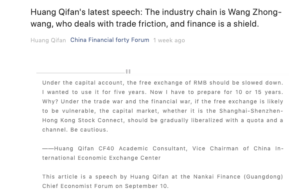
They will not be singing Frank Sinatra at the end
China is authoritarian. The Standing Committee of the Politburo knows it lacks legitimacy delivered at the ballot. Its survival therefore tenuous, dependent on maintaining the social contract requiring the regime to deliver economic growth already under pressure and unlikely to ever return to the claim of double digits. The leader for life is acutely aware of the fate of these kind of regimes historically. The CCP will do everything in its power to avoid what happened to the Soviet Union, the memory of which is permanently imprinted on their brains.
Hong Kong enjoys a unique set of freedoms within China and does so because it is a financial centre that the country can use to its benefit for access to global capital. Dollar funding for Chinese companies raising equity in a stable and fully convertible currency and a market that enjoys liquidity. Nascent RMB debt markets where foreign institutions can participate freely and will continue to grow. All of which depends on the rule of law that protects investors. There is an argument that the city is so important it is irreplaceable. That the rule of law is sacred and therefore Hong Kong will never be sacrificed. I am very sympathetic having been raised on the idea that sacrificing the rule of law is sacrilege.
The rule of law is the centre piece of my thesis which I repeat once again. Democratic competition and civil rights though preferable are not absolutely necessary for prosperity. Good policy, political stability and property rights are central.
Hong Kong is replaceable and if necessary, will be sacrificed. Chinese companies needing to raise capital can do it in Singapore with its stable convertible currency, trading desks and a respected regulator sitting in the same time zone. Every innovation in financial markets that has resulted in Hong Kong’s rise as a financial centre can be used against to undermine its role as a financial centre and send the business elsewhere. Direct investments into china can originate from and be arbitrated in multiple jurisdictions. There is no rule which says Hong Kong must perform that function.
Even in states like India, where the rule of law is arbitrary and the government engages in regulatory uncertainty, large global companies continue to invest directly, presumably because the risk is worth the reward. Obviously, investment destinations are more attractive when property rights are enforced and there is regulatory certainty. So long as there is a story, the money will always flow. And like realism, capitalism is fundamentally amoral.
The point is, ladies and gentleman, that greed, for lack of a better word, is good. Greed is right, greed works. Greed clarifies, cuts through, and captures the essence of the evolutionary spirit. Greed, in all of its forms; greed for life, for money, for love, knowledge has marked the upward surge of mankind. Gordon Gekko
Those who bank on the claim that China will never “kill the goose that lays the golden egg” which was the much–repeated argument when the joint declaration was signed, should not be so certain. Beijing has options, they may be much less preferable to a financial centre under its sovereignty and control. But if it needs to, it will kill that bird and eat it.
The bonfire of the vanities
Hong Kong has freedom but the city cannot be used as base from which to subvert the regime in China and it is reasonable to expect that a city under its sovereignty is not used in that way given Hong Kong has privileges the rest of the country does not. Some, perhaps many in China ask why Hong Kong should have those privileges? Why is it special? Why should the people have rights not available to people who live on the mainland? I suspect many people in India will be familiar with those questions in terms of asymmetric federalism. The argument of legacy or inheritance will never be good enough answers for people who ask such questions.
Beijing has relaxed its media blackout and is obviously projecting its own narrative of what is happening in Hong Kong. Instead of mainlanders reciprocating, there has been what appears to be renewed support for the government and accusations of privileged and spoilt Chinese citizens living in Hong Kong. There are many people claiming to be China experts who say this is not true, that there is sympathy and that sympathy is being silenced. I asked a friend of mine whom I grew up with and does business extensively on the mainland, has been doing business in China since the mid 90s and travels across the country to cities rarely visited by westerners. I asked him what do the people he interacts with think.
His rather innocuous response was there may be people who are sympathetic. The people whom he does business with have an interest in the party remaining in power. They are a globalised elite that are well travelled and they do not sympathise and think everything is under control in China. That comment has more value to me than any of the China experts I follow. He made his comment to an audience of one, made it clear he cannot speak for everyone, truthfully told me his counterparties have everything to lose if there is regime change and most importantly and has no agenda.
There are close to 400,000 students from mainland China studying in the United States alone. Add students from Australia, New Zealand and Western Europe and the number is probably close to 750,000 give or take. All of these students have access to media in the countries they study. They have free access to information not hidden behind the great firewall and yet the experts cannot explain why these students are not more vocal about how the feel about the regime in their country. Presumably some will be worried about the safety of their families, but is that a good enough explanation for all of them?
It is not surprising China is suspicious of whom is sponsoring what is happening in Hong Kong. From Beijing’s perspective, foreigners have interfered. Non-intervention is a key principle of sovereignty flowing from the Treaty of Westphalia where the modern state system was born. This principle of non-intervention which all states consider to be sacrosanct has been violated in Hong Kong so many times it is no longer even a hypocrisy and look at the evidence.
NED is funding pro-democracy groups. Western media is covering events in a manner that incites the overthrow of the state. CNN’’s Kristy Lou Stout after the near lynching at the airport was still equivocating over whether the term violent was appropriate. Hong Kong Free Press is a foreign run media organisation that runs a business based on supporting protestors. American diplomats have publicly met with poster boys of a movement seeking the violent overthrow of the government.
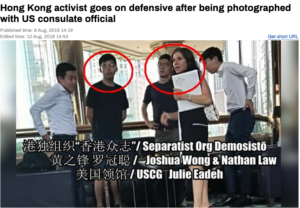
Replace everything in the previous paragraph with Russian organisations, journalists and diplomats engaging in that behaviour in the Unites States and what would be the response? Alleged Russian interference in American domestic politics has resulted in so much hyperventilation, the threat of impeachment against a sitting US President started from the moment of inauguration and continues unabated today.
Three months ago, there was naiveite. civil society groups had agendas that were pure. Their interests were those of the people in the countries they were worked in and not the state, groups or individuals from whom they received funding. The money raised came from individuals not institutions or groups with interests of their own. Groups who have no problems coopting the optics of human and civil rights to further their own agenda. Three months ago, that would all have sounded like conspiracy theory, worthy of mocking anyone making such claims. Today, innocence has been lost, virginity has been taken and things will never be the same again.
Three months ago I never would have imagined propaganda on the scale I have seen was even possible. Not only do I doubt everything and everyone, I doubt my own sanity. This is the post truth world and that is not a cliche, Orwell is here, he just got the date wrong.
I did not watch the events of Occupy Central in 2014 with a microscope because at the time I was struggling to come to come to terms with the country I now call home, something I continue to do. A struggle with the alienation felt living somewhere I come from but do not understand and never truly will. I watched Hong Kong back then from a distance unaware of what was happening and unaware that mainstream media narratives are not to be trusted fully. It was a rather large surprise that allegedly there was an offer back then of the conditional sovereignty promised under the basic law extended to pan-democrats by Beijing. According to unconfirmed reports the deal was rejected because it did not meet demand was for genuine universal suffrage.
I want it all and I want it now
If there was a deal on the table in 2014, then that is game change. This deal was reported by New York Times columnist Tom Friedman. Few paid public intellectuals I hold in high regard and certainly not Mr. Friedman so I take that claim with a pinch of salt. Nevertheless, his Hong Kong piece was blockbuster because of this allegation of rejection of conditional sovereignty. Venom was spewed and there was much hissing. Mr. Friedman argued in his piece, the best must not be the enemy of the good and there is no real response to that from the protest movement which is why there was so much venom. It is not an argument that can be vitiated if Mr. Friedman’s allegation is true.
Extending Mr. Friedman’s argument a little further. Conditional universal suffrage defined as candidates for the legislature and chief executive that have for simplicity sake been approved by Beijing is a confidence building measure. To be quite frank conditional isn’t even really that bad given as argued earlier Hong Kong has no option but to tie itself economically and arguably politically to the mainland. Nevertheless, if genuine universal suffrage is the demand, the only way to arrive at that destination is to travel through conditional first.
Whilst there is no guarantee Beijing would ever grant the demand of genuine universal, there is no downside to conditional. The argument I advance is once Beijing understands the risk of collapse on the mainland from conditional is minimal, it may well be willing to accept genuine, knowing any candidate for legislature or chief executive will only seek to design policy, rather than challenge its sovereignty or demand independence. In fact, I claim there is no reason to fear Beijing will reject a future request for genuine universal. As said earlier events in Hong Kong are now being broadcast by the media, obviously for their own purposes, but it does suggest Beijing is not afraid that violence could extend into China
If it turns out the pan democrats really did refuse the request for conditional, then the real guilty party amidst Hong Kong’s bonfire of the vanities will be the very same people who today demand nothing more and nothing less.
I don’t need no civil war
Typically, Beijing has not intervened during moments of political crisis in Hong Kong. Its strategy has been to let the crisis play out and eventually run out of steam. That is what it appears to be doing today. There has been sabre rattling with threatening statements from Chinese officials and troops massing on the border with their movements being filmed. There was speculation that troops would be deployed and bloodshed was inevitable. Speculation came from yours who saw bloodshed as inevitable. Fast forward to today, it would appear, like Paris where violent protests have raged every weekend for 45 weeks and life during the week is business as usual, Beijing will not intervene in my opinion largely because there is no need.
Beijing has been adroit, eschewing the intervention I was so very afraid of to begin with. Allowing the police force to deal with low intensity demonstrations that happen outside of working hours and usually end before the last train home departs. Beijing has conveniently forced the Hong Kong government and its Chief executive to soak up the vast majority of criticism, though it continues to be criticised for trade and human rights practices. It no longer looks like there will be a military intervention as the protestors become more radicalised, less rational and eventually start to lose support.
A low-level war of attrition between police and frontline protestors can be waged for years if necessary and even if the intensity increases it would have to do so many fold and infect the mainland before becoming a real problem. Some journalists believe this time it’s different. That the people of Hong Kong are united, that they will continue to support the protest movement until political goals are achieved. My response is to fight the power and win, the city needs to be prepared to sacrifice everything, life, liberty, property and the shirts of their backs if necessary. They must be prepared to fight this battle for decades because all of that is what it takes to beat an organised and equally determined CCP.
There is nothing in my decades of experience in Hong Kong that tells me, people with a lot to lose will continue to support those with nothing to lose once they start realising financial losses. Long term violent political agitation will impact the economy, property prices have started to declining already, tourism has taken a beating, retail figures have fallen and hotel occupancy rates are so low rooms are being rented for almost nothing. For now, ovations by shoppers for violent frontline protestors returning from the battlefield to their airconditioned mall hideouts. If there is still applause five years from now, I’ll start betting against Beijing. If there is that kind of applause a decade from now, I’d be willing to go all in.
Impressive, but wake me up if they are still doing that 5 years from today
To be or not to be
People tend to be very courageous about war before they understand the true costs they must absorb. Once the point of no return has been reached, they no longer have any choice but to continue and bear the cost, so they do. There will always be a choice in Hong Kong and that is it is weakness, to bear or not to bear that is the question. A city with an average per capita income of approximately US$50,000 has no real incentive to reduce that figure.
Whilst there are violent demonstrations all over the world, they tend to be fought by the most radical with the moderate and ambivalent sitting the protests out as they escalate. As soon as the Rubicon is crossed, and Caesar has no option but to either win or die, support in Hong Kong will as Mr. Greer claims most likely disappear and violent frontline protestors will no longer enjoy the that which has sustained them until today.
Beijing has plenty of strategies available. When the eyes of the world were transfixed by those images at the airport, everybody had an opinion as to whether it would intervene using violence. My opinion at the time was that it would only do so, if it believed the police force could not manage law and order and its monopoly on violence was under threat. At the time of writing, it no longer looks as if that is the case. It does not seem that the movement is effective as it was to begin with. It says all five of the hastily drafted set of demands must be met, not one less. For Hong Kong residents that will be interpreted as violent protests will continue indefinitely.
If I were sitting in Beijing watching at this moment, the strategy of having the Hong Kong Government and its police force manage the crisis is paying off. Violence is sporadic and despite the optics and opprobrium at brutality, has been managed without any deaths and relatively few serious injuries given the backdrop of violence. Beijing does not need to get its hands dirty and give critics a reason to level. yet more human rights accusations. A low intensity war of attrition waged by the Hong Kong police force against a leaderless protest movement with no real strategy other than uncontrolled aggression does not appear to require military intervention.
There are several choices available that could impose penalties on Hong Kong without the need for blood. To begin with, Hong Kong depends on China for almost all of its water requirements and that would not change even in the unlikely event independence was granted. If Beijing really wanted to go nuclear without firing a bullet, turning the taps off is one possible solution. Three days of no water even the most ardent sunchartist hedge fund hypocrite would defect or leave. Obviously, Beijing would probably never cut the water supply, but the point being made is there are options available that do not require violence.
The less radical way to deal with the crisis is to essentially reduce Hong Kong’s importance to the mainland over a period of time. Long term Hong Kong will continue to lose relevance as a financial centre. Policy makers will continue financial market liberalisation and eventually the currency will be fully convertible and there would be no real need for Chinese companies to list in Hong Kong. Alternatively, HKD could be made legal tender in Shenzen and Chinese companies could list their shares on that exchange, although the rule of law would be a problem as would capital flows and it is unlikely the PRC would be comfortable with a second currency as de jure legal tender even though HKD is de facto.
Ultimately, even if Hong Kong were to achieve its goal genuine universal suffrage, greater autonomy or even outright independence, can it ever really expect that it will be free from interference. Its sits in the vast shadow cast by its giant and far more powerful neighbor. There is a democratic presidential election taking place in Taiwan where the accusation is the mainland is interfering and it is almost inconceivable that Beijing would not use that opportunity to try an achieve an outcome in its favour. The situation is more acute in Hong Kong by virtue of geography and a land border. Hong Kong will never be free.
It is better to be feared
Punitive punishment is not the best approach in my opinion. I return to Machiavelli with his most famous misquote that many Indians believe falsely, was written by Kautilya. “It is better to be feared than loved” he says in The Prince. It is misquoted because that line is used so often and without context. One can be forgiven for assuming Machiavelli was suggesting states or anyone seeking to obtain and maintain power only have a binary choice available to them. The chapter the quote is taken from offers much more nuance. Machiavelli adds a wise prince should never end up being hated. That is a really important qualification because it means a prince must seek to find a balance between fear and love, and that strength and cruelty should never result in hatred
This is the mistake the government has made; it is now the object of hatred and that mistake was most likely made by Beijing wishing to project strength. The government should have acted to kill the bill much earlier than it did. That Mrs. Lam obstinately rejected this demand until it was too late suggests Beijing would not grant her permission. The response to that decision resulted in the population becoming increasingly antagonised, radicalised, polarised and ultimately violent. Both the governments in Beijing and Hong Kong acted to compromise political stability, the protestors response has been to undermine the rule of law.
The grievances the people of Hong Kong have are legitimate and it is possible to ameliorate them. The tools are available to ensure the elderly lead a more dignified life than the US$170 a month pension affords them. The few thousand homeless people in Hong Kong always have a bed, food and don’t need to sleep in 24 hour McDonalds. The vast land banks owned by tycoons and the government are used for building instead of creating artificial scarcity, inflating property prices producing unaffordable housing, boosting profits and revenue.
Beijing needs to be unequivocal about its commitment to the Basic Law, a document it spent years negotiating and signed. It may well have reservations, surely the People’s Republic of China has enough self-confidence to honour its agreement in both letter and spirit and not fear what will eventually return to being the equivalent of a fishing village one day. Most importantly, the kids need to feel optimistic about their futures, that when tomorrow comes, it will be better than it is today.
How does Hong Kong achieve a sense of optimism again, I have no answers I’m afraid. But before the hard work begins, the chaos, bitterness and violence must end. We are in a situation which cannot be mediated. A settlement that cannot be negotiated and a positive future at this moment cannot be envisaged just yet and everyone must accept the blame. What have we done to our home? When did it become acceptable to be indecent? why did we stop listening? and can we ever start talking again?
Three months ago, I wrote Hong Kong has a future ahead of it. I deliberately did not say what it was, not just because I didn’t know but optimism can sound cliched. I’ve changed my mind, optimism is essential. Too much water has now flowed and the bridge is nowhere to be seen. Even if the protests subside, the kids that fought this summer will never ever let go and whilst the adults refused to deliver guidance, Beijing will not let Hong Kong forget. Everyone in this story will be punished because there was a failure to object.
When some kind of normalcy returns, Hong Kong must once again re-invent itself, as it has done so many times before. This time it must be inclusive, because it can no longer depend on the tide alone. There is reason to be optimistic. We built this city and we can rebuild it again. We need to invest in all of our futures whilst also taking care of all of our pasts. We may never be able heal the legacy of division, but we can finally develop a sense of compassion. We must eliminate the alienation that drove the city almost to the brink of madness. So that our next generation looks back at these few months and says to themselves, those were the best days of our lives.
WOW! beautiful.
“If I feel antipathy towards democracy, it’s not because I am disappointed with political outcomes, it is because in the jungle, only tyranny roams free. ”
Perhaps the only thing i disagree, but that’s for another day
That is a worthy disagreement. And in your favour, the original was edited for aesthetic reasons and that is a sin.
what a long post! lost track of of the point, if any, being made
Well there are probably half a dozen points if not more, forgive me if I choose not to list them.
The main thesis, is repeated twice,
once at what is the end of the beginning, and then repeated for good measure at the beginning of the end.
Thanks for reading, though I am genuinely surprised anyone would
Thank you for this post, it’s rather well written. I also went through the speech of Lee Kuan Yew that you hyperlinked.
I wouldn’t say that he didn’t have time for universal rights, just that he was pragmatic enough to understand the stage at which his country was in Maslow’s hierarchy. The quote by John Adams comes of mind of having to study politics and war so that his sons may study mathematics and philosophy.
During my time in Singapore (his son was already PM then and he was still alive), I didn’t notice much of a personality cult towards him, he received more of the grandpa-ish elderly respect thingy you see in Asian societies rather than a Maoesque feared deference. Since it’s a small country you can sometimes chat with politicians in an informal friendly way after speeches and events, so I guess that reduces power distance.
I would say minorities in Singapore have it the best in terms of rights in the whole of SE Asia. They may not get much face time and social capital in the visible movie and pop culture/fashion industries (eg: Crazy Rich Asians) but they’ve definitely had it better than the surrounding nations and avoided the majoritarianism that the other countries had to go through.
Thank you for reading the piece, and I appreciate the take. Its not somewhere I lived so I can’t have the same level of understanding you will.
Lee Kwan Yew was a intriguing historical figure with a remarkable record and it doesn’t surprise me there has been one party rule since independence. It has outshone Hong Kong in what was once a competition for the role of Asia’s world city.
If you look at how he managed the Singapore Airlines pilots strike, he was prepared to burn the Airline to the ground first rather than negotiate. I’d be very interested to see how he would have dealt with what is happening in Hong Kong had he been running the show
https://www.youtube.com/watch?v=ytMXSLeqFMY
SG is fascinating place and there is a lot going on there right now too. Chief among them the discussion about how the majority treat the minority. Things will never change and that is fine but they are talking and not ignoring it as they basically do in HK. sober not shrill conversation is good, contrition is unnecessary recognition is. Singapore is a wonderful city, quintessentially South East Asian and I do hope it manages its evolution without chaos.
The person who shared this piece is Oxbridge educated and the quote he chose as click bait was “white monkeys” I read the piece three times and I my response was this is a multidimensional piece on a conversation happening in Singapore, and the quote chosen was arguably the most reductive thing to use to describe what the author was saying.
https://www.scmp.com/week-asia/opinion/article/3023106/race-singaporeans-must-open-their-eyes-home-thrive-abroad
“the western societal concept of atomised individuals with a set of universal rights is not automatically aspired to by everyone. Many countries in Asia and indeed around the world are societies where extended families, culture and group identity are sacred, privileged over individual identities and their rights.”
I can relate. Americans just dont get it. I used to think that at least brown americans will get it, but seems like i used to overrate them.
Its just culture. When I read about liberal democracy for the first time, it was after having read about absolute sovereignty and the problem posed by both majorities and unchecked power.
This system of universal rights serving as a legal limit on both power and the majority, its very seductive and I’m sold, I’m in. I’m just acutely aware in the rest of the world it may not be for many people.
Its not perfect. But look if you do live in the richest most powerful country on the planet and you ask what the secret sauce was and is, you are pretty much told from birth or the day you arrive and most people will never question that.
You get both types in both cultures (East and West), though the distributions may be quite different. And it doesn’t matter what one values, both individualism and collective feeling are necessary in different ways for a society that can function as well as progress. Just like you say many Americans don’t “get it” about the East, so do most Easterners not “get it” when it comes to what makes the West tick.
People like LKY have existed in the States too, but at the municipal level, like mayors (which is really what the late great Lee was: Singapore’s Mayor.) Strike busting and authoritarian law and order enforcement has a long history in the states, but only at that level. The East (India especially) could learn a lot from American federalism (and not just dismiss America for its permissive individualistic culture.)
I’d beg to differ, LKY was not a mayor. Learning from each other is kind of one of the themes of the post. Its not that improvements can’t be made by all states, and everyone can’t learn from one another. Its the assumption that they don’t know whats on offer are being denied and that’s the reason things don’t change and should change.
Consent is one of the themes of the post, are they being denied or are they consenting. In SG they are consenting, there is an election and single party rule since independence, they wanted a man with iron like Lee says he was.
Mike Bloomberg was on Hoover, and plenty of jokes about him saying Xi has constituents. But he does. One in ten in that country decides they are done with him and the party and its over for them. He does have to respond and its existential.
Hoover mocked him, asking with surprise is revolution really a check? you betcha, more so than a vote, they could lose their lives and they know it. So you can spend a fortune on domestic security and the great firewall, the latter growing less important in my opinion as time goes on because so many people bypass it already. Or you be responsive. And you look at their system, it is a competitive bureaucracy. People are vying for power and the basis of promotion is running a P&L and delivering.
Does it have all the problems everyone says it does, I don’t doubt that. Does that mean failure is inevitable. I don’t know, too early to tell?
Permissiveness really besides the point. Asia is heterogenous, you get the most conservative societies to places that are very eye opening for westerners on their first time. India too is heterogenous and our model with all its imperfections and problems is based on that.
Can things be improved for everyone? always, but beside the point as argued.
I’m not sure what it is you and I are disagreeing about really. I’ll concede your first point; that LKY was not just a mayor, he marshalled Singapore’s foreign and trade policy quite effectively, which a mayor wouldn’t have to do. But I was referring to scale; LKY could do so much and so effectively because he was close to his people and had their trust. Closeness and trust can’t be scaled up to the national level; indirections take their toll.
And my points about individualism and collectivism were about society, not politics. I was responding to Scorpion’s comment.
My bad, and apologies, I misunderstood.
And yes, I can’t see how one would be able to scale Singapore either, which is why I find the idea of SG on the Thames a little bit dubious as the rationale for Brexit, it kind of sounds more like London on the Thames which is….
I am no expert on China, so I am asking this question with a genuine curiosity. What is the *real* reason Hong kongers are protesting? Afterall the extradition bill that sparked the protests is long dead. Is it the language? (I know that hong Kong is Cantonese speaking as opposed to mandarin, but so are millions of south Chinese). Is it the religion? (Hong Kong has higher proportion of Christians than mainland, but not overwhelmingly so). Are they starving? (obviously not). Is it really just that the ordinary hong konger feels an irrepressible urge to throw choicest of Cantonese abuses at Xi Jinping in public, and authorities won’t allow them? Or is it just bored youngsters who couldn’t take too much of a good life?
You vehemently denied the argument of separate identity of hong kongers, but then contradictically eluded to hidden racism of chinese. I have heard that north Chinese tend to look down upon south Chinese. Is it that angle? May be Hong Kongers took this hidden racism in their stride as long as they were miles ahead of mainlanders economically, but now with the economic gap closing, the racism of north Chinese has started to sting? Can you elaborate?
Elites create the narrative & masses follow, even here arguments & info flowing from all sides are elite narratives while locals join in whenever they see an opportunity for ‘Change’. Public don’t care about all these ‘Elite & academic issues’ instead what they really care about improvement in their live any way possible. When things are not working for you then disruption is the best possible outcome.
Elites constantly demand action from public because they know that public reaction helps them justify their narratives & they understand that one who controls the narrative controls the power, at the same time public at large have no other alternative to join ‘One elite’ or ‘another’ which gets termed as revolutions.
Well that’s the way i see revolutions & conflicts for now.
I’m no expert either. I can’t tell you what mainland Chinese think about Hong Kong Chinese because frankly I never had those conversations with them.
I left before it got to a mainlander is a locust and a Hong Kong Chinese is a cockroach. There is no contradiction. As I understand it the insult of Cockroach is in response to the insult of locust. As I said in the post first it was snobbery and then it became what I hesitated to say in the post but what I actually really think a sense of inferiority now. If it’s not that then their sense of superiority has been undermined.
Also you have to remember the comparison isn’t equivalent. HK is a city of 7 million plus, China well over a billion. Generalizations aren’t great, but it’s hard to imagine more than a minuscule percentage of people on the mainland even care about HK. I think they started to after restrictions were lifted on covering the crisis on the mainland but of course there will be propaganda so no surprise.
Why are they protesting, well they say they the basic law is not being respected, and there is some truth to that which I failed to discuss properly in the post but alluded in terms of renditions. I did spend a lot of time on why I think they are in the protesting.
Fundamentally 2014 should have put the government on notice. Back then that kind of demonstration was shocking. Instead of responding it continued with business as usual.
My personal opinion, if they felt they had economic opportunities and inequality wasn’t so drastic they wouldn’t be protesting. They warned in 2014, the govt did not listen, was ham fisted and now it is the 70th Anniversary of the PRC today and I’m sure a few people will be donning gas masks in Hong Kong today
Outstanding piece. Don’t be afraid to have it give birth to smaller pieces in the future, dealing with different aspects of the whole, answering questions, raising new ones.. Great Job Hack bhai 🙂
A very educational piece written with the academic distance steeped in deeply personal first-hand knowledge of HK’s society and its history. That duality is the most wonderful aspect of the article.